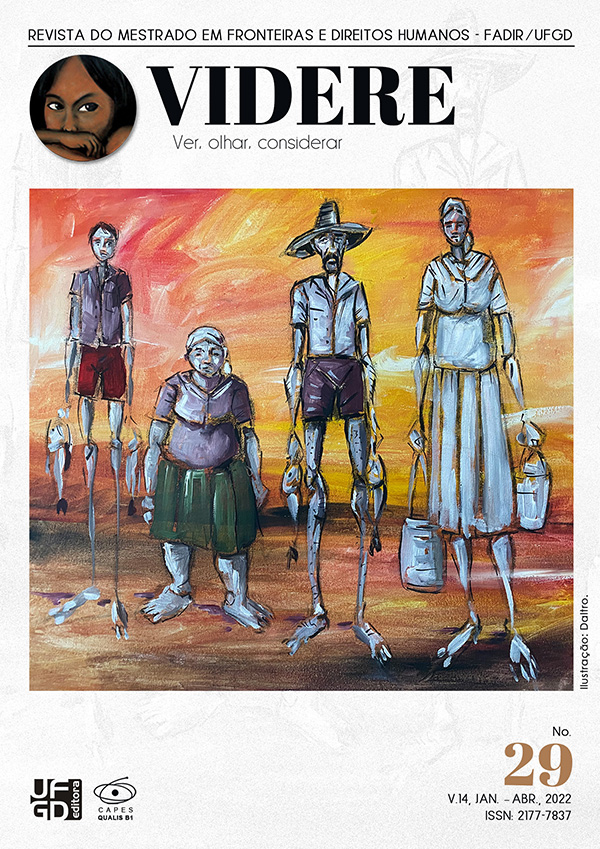The right of personality in education in the municipality of Paranavai and its implications in public policy and judicialization in municipal centers for child education
DOI:
https://doi.org/10.30612/videre.v14i19.14421Keywords:
direito à educação, política pública, direitos da personalidadeAbstract
It is an applied, exploratory, descriptive and qualitative social research, which uses the analysis of documents related to municipal and state management and the judicial decision in face of a municipal entity. In this sense, we seek to analyze a concrete case of judicial activism where the public civil action was used as an instrument capable of causing damage to the implementation of public policy of inclusion of children in municipal early childhood education centers. It appears that the judicialization of rights, such as education, is likely to enter the merits of the administrative act and public policy itself, causing a huge mismatch and commitment of the organization in the municipal education departments. As a result of this scenario, the possibility of collision between fundamental rights stands out: individual right to education versus the right to maintenance and isonomy of collective education. At the end, a case that occurred in the Municipality of Paranavai/PR is presented, and the possible outcomes related to similar situations.
Downloads
References
BITTAR, Carlos Alberto. Os direitos da personalidade. 5 ed. Rio de Janeiro (RJ): Forense Universitária, 2001.
BRASIL. Ministério da Educação. Conselho Nacional de Educação. Parecer CNE/CEB Nº: 8/2010. Disponível em: http://portal.mec.gov.br/index.php?option=com_docman&view=download&alias=5063-parecercne-seb8-2010&Itemid=30192. Acesso em 19 mar. 2021.
BRASIL. Presidência da República. Casa Civil. Subchefia para Assuntos Jurídicos. Constituição da República Federativa do Brasil de 1988. Disponível em: http://www.planalto.gov.br/ccivil_03/constituicao/constituicao.htm. Acesso em 19 mar. 2021.
BRASIL. Presidência da República. Casa Civil. Subchefia para Assuntos Jurídicos. Lei nº 9.394, de 20 de Dezembro de 1996. Estabelece as diretrizes e bases da educação nacional. Brasília (DF): 1996. Disponível em: http://www.planalto.gov.br/ccivil_03/leis/l9394.htm. Acesso em 19 mar. 2021.
BUCCI, Maria Paula Dallari. O conceito de política pública em direito. In: BUCCI,
Maria Paula Dallari (org.). Políticas públicas: reflexões sobre o conceito jurídico.
São Paulo (SP): Saraiva, 2006.
CANOTILHO, José Joaquim Gomes. Direito Constitucional e Teoria da Constituição. 2. ed. Almedina (PT): Coimbra, 1998.
CELLARD, A. A análise documental. In: POUPART, J. et al. A pesquisa qualitativa: enfoques epistemológicos e metodológicos. Petrópolis (RJ): Vozes, 2008.
CHIZZOTTI, André. Pesquisa qualitativa em ciências humanas e sociais. 4 ed. São Paulo (SP): Cortez, 2000.
DANTE, Caroline Rodrigues Celloto; LONCHIATI, Fabrizia Angelica Bonato; MOTTA, Ivan Dias da. O direito à educação infantil: a responsabilidade municipal e alternativas jurídicas de efetivação. 1 ed. Maringá (PR): IDDM, 2018.
MARTINS, Kallyd Silva. Consumidor consciente: o impacto na cultura de judicialização. Revista Videre, v. 11, n. 22, p. 207-222, 2019.
OLIVEIRA, Rafael Carvalho Rezende. Curso de Direito Administrativo. São Paulo (SP):
Método, 2017.
PARANÁ. Secretaria Estadual de Saúde. Resolução SESA nº 0162/05. Disponível em: http://www.saude.pr.gov.br/arquivos/File/Legislacao/estudual_resolucao/CEI_CentrodeEducacaoInfantil.pdf. Acesso em 09 mar. 2021.
PARANAVAÍ. Prefeitura da Cidade de Paranavaí. Secretaria Municipal de Saúde. Pretensão de vagas - CMEIs e CEIs Municipais – 2020. Disponível em: http://www.ingabyte.com.br/sistema/arquivos/12101/161219162830_pretensao_de_vagas__16_122019__publicacao_final_1_pdf.pdf. Acesso em 09 mar. 2021.
SECCHI, Leonardo. Políticas públicas: conceitos, esquemas de análise, casos práticos. São Paulo (SP): Cengage Learning, 2010.
SILVA, Fábio de Sousa Nunes da. Análise crítica quanto efetivação do direito fundamental à educação no Brasil como instrumento de transformação social. Disponível em: http://www.lfg.com.br/public_html/ article.php?story=20080624114112546. Acesso em: 21 de fev. 2021.
SMOLAREK, Adriano Alberto; MIRANDA, João Irineu Rezende. Limiares do ordenamento jurídico na dicotomia entre o interno e o internacional: o controle de convencionalidade como inovação hermenêutica para a materialização dos direitos humanos na América Latina. Revista Videre, v. 12, n. 23, p. 7-21, 2020.
SOUZA, Celina. Estado da Arte da Pesquisa em Políticas Públicas. In: HOCHMAN, G.; ARRETCHE, M.; MARQUES, E. (Orgs.) Políticas Públicas no Brasil. Rio de Janeiro (RJ): Editora Fiocruz, 2007. p. 65-86.
STJ. Superior Tribunal de Justiça. Consulta Processual. REsp nº 466861 / SP (2002/0105071-0) autuado em 02/10/2002, 2008. Disponível em: https://ww2.stj.jus.br/processo/pesquisa/?tipoPesquisa=tipoPesquisaNumeroRegistro&termo=200201050710&totalRegistrosPorPagina=40&aplicacao=processos.ea. Acesso 18 fev. 2021.
ZANINI, Leonardo Estevam. A violação de direitos da personalidade do autor pela prática do ghost writer. Revista Videre, v. 12, n. 24, p. 8-25, 2020.
Downloads
Published
How to Cite
Issue
Section
License
Copyright (c) 2022 Revista Videre

This work is licensed under a Creative Commons Attribution-NonCommercial-ShareAlike 3.0 Unported License.
Authors must accept the publication rules when submitting the journal, as well as agree to the following terms:
(a) The Editorial Board reserves the right to make changes to the Portuguese language in the originals to maintain the cultured standard of the language, while respecting the style of the authors.
(b) Authors retain the copyright and grant the journal the right to first publication, with the work simultaneously licensed under the Attribution-NonCommercial-ShareAlike 3.0 Brazil (CC BY-NC-SA 3.0 BR) that allows: Share - copy and redistribute the material in any medium or format and Adapt - remix, transform, and create from the material. CC BY-NC-SA 3.0 BR considers the following terms:
- Attribution - You must give the appropriate credit, provide a link to the license and indicate whether changes have been made. You must do so under any reasonable circumstances, but in no way that would suggest that the licensor supports you or your use.
- NonCommercial - You may not use the material for commercial purposes.
- Sharing - If you remix, transform, or create from material, you must distribute your contributions under the same license as the original.
- No additional restrictions - You may not apply legal terms or technological measures that legally restrict others from doing anything that the license permits.
(c) After publication, authors are allowed and encouraged to publish and distribute their work online - in institutional repositories, personal page, social network or other scientific dissemination sites, as long as the publication is not for commercial purposes.



















